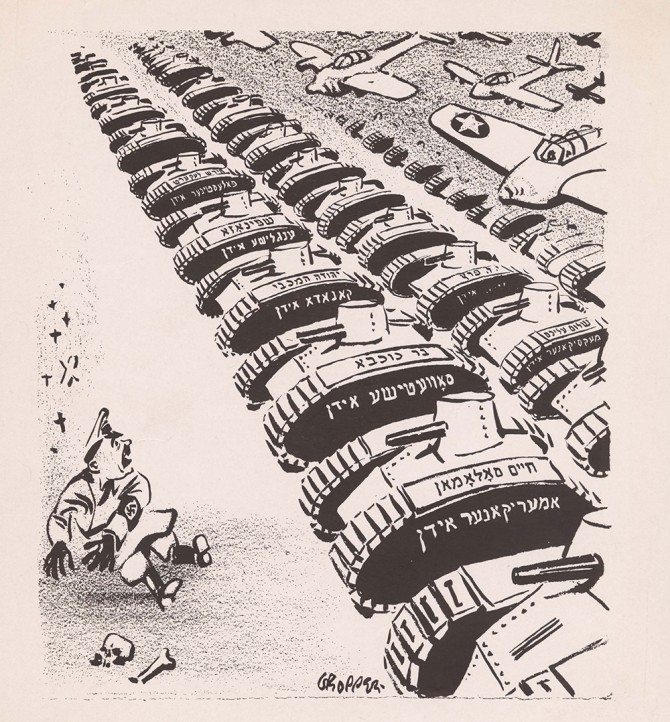Documents illuminate U.S. Yiddish-speaking life until the Cold War
By Melanie Lefkowitz
Newly digitized documents from the archives of the International Workers’ Order (IWO) and the Jewish People’s Fraternal Order – including three letters from artist Marc Chagall – cast light on the lives of Yiddish-speaking Jewish immigrants in the United States during World War II and the Cold War.
The documents, which also include anti-Nazi posters and leaflets and a rare 1941 poetry anthology published in Moscow by the Jewish Anti-Fascist Committee, are part of the Cornell Library’s Kheel Center for Labor-Management Documentation & Archives in the ILR School.
They were digitized through a 2016 award from the Grants Program for Digital Collections in Arts and Sciences to Jonathan Boyarin, the Mann Professor of Jewish Studies, and Elissa Sampson, visiting scholar and lecturer in the Jewish Studies Program in the College of Arts and Sciences, in collaboration with the Kheel Center and the library’s Digital Consulting and Production Services.
“These archives offer a window into Jewish life at a time when Jews had very narrow choices given the constraints of dealing with Nazism, fascism, World War II and Stalinism,” Sampson said. “The documents contain the seeds of a fascinating and detailed history of competing and complementary loyalties during World War II: to the Soviet Union and a progressive international left-wing movement; to the United States; and to the Jewish people and the propagation of a secular Yiddish culture.”
The IWO was founded in 1930 as a fraternal organization providing benefits such as health insurance to its members. Its Jewish division, the Jewish People’s Fraternal Order (JPFO), was the second-largest Jewish fraternal organization in the United States. More than 1,700 digitized documents, in English and Yiddish, are organized online into categories including education, black-Jewish relations, Albert Einstein, women’s work and “World War II Jewish tanks and poems.”
Striking images document Jewish support for the World War II effort. In one 1942 Walter Gropper cartoon, Hitler cringes before a row of tanks labeled, in Yiddish, “American Jews,” “Soviet Jews,” “Canada Jews,” “English Jews,” “Palestinian Jews.” These tanks are given famous Jewish names such as Bar Kokhba, Maccabees, Spinoza and Heine. The Chagall documents include a letter, in French, in which he asks the French consul to support a Jewish orphanage and a note to the JPFO’s general secretary, written in Yiddish.
The IWO was shut down by the New York State Department of Insurance in 1953 because of its political affiliations in a case decided by the U.S. Supreme Court. Its archives were then confiscated by the state, which later donated them to Cornell. Additional papers and books were donated to Cornell University Library by the Saltzman Schwartz family.
“The International Workers’ Order collection offers a rich basis for understanding the organization’s work with, and impact on, organized labor,” said Barb Morley, digital archivist at the Kheel Center. “These materials document vital social and economic efforts.”
The collection supports a wide range of scholarship, including American history, legal history, labor history, international and Jewish studies, gender studies, literature and music and immigrant culture, and fraternal societies. They complement the Kheel Center’s International Ladies’ Garment Workers’ Union and Amalgamated Clothing Workers of America collections, which also include information about IWO branches formed by union locals, as well as the collection on the Triangle Shirtwaist Factory fire.
Melanie Lefkowitz is staff writer, editor and social media coordinator for Cornell University Library.
Media Contact
Get Cornell news delivered right to your inbox.
Subscribe

